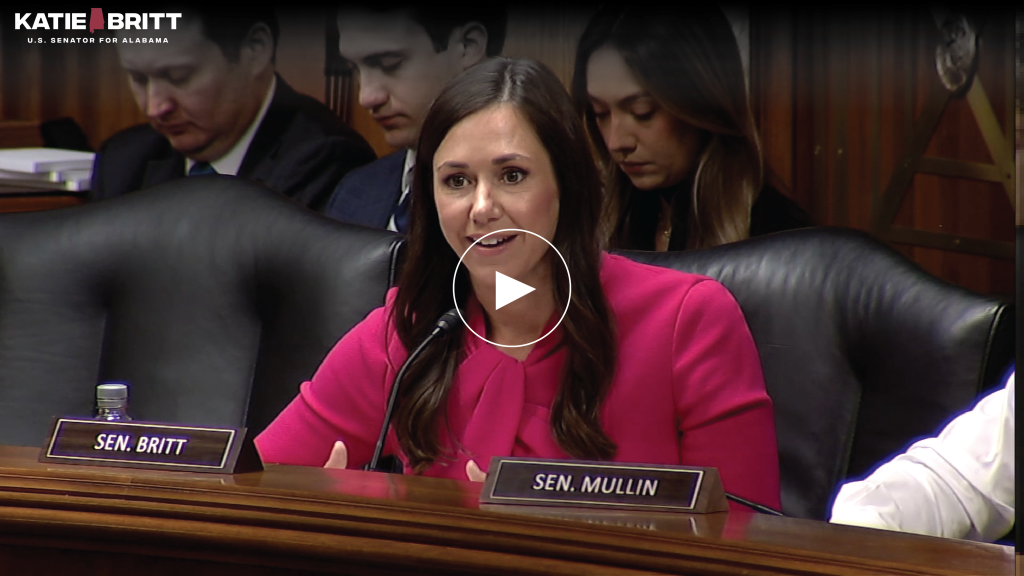U.S. Senator Katie Britt (R-Ala.) recently attended a Senate Appropriations Labor, Health and Human Services, Education, and Related Agencies Subcommittee hearing with Education Secretary Linda McMahon to discuss the President’s Fiscal Year 2026 (FY26) Budget Request for the Department of Education.
Senator Britt’s initial line of questioning highlighted the state of Alabama’s 14 historically black colleges and universities (HBCUs): “Alabama has more HBCUs than any other state in the nation. We are proud of the work that is done on those campuses. We know that it helps strengthen student experience, our workforce, our communities, and our future. So if you look across coast to coast, there are about 285,000 individuals that are attending HBCUs, and the Strengthening HBCU program has about $300 million annually allocated to supporting the operations and student services and academic infrastructure.”
“Can you walk us through in the President’s FY 26 budget, what you have put in place to continuing to make sure that our HBCUs can thrive and provide that educational opportunity for so many students that otherwise wouldn’t have it?”Senator Britt asked.
“We are continuing the educational support and the budget support that have been for HBCUs. It’s one of the promises that the President made, and that’s exactly what we’re going to continue to do,” Secretary McMahon responded, additionally affirming assistance for grant administration or technical assistance will remain in place.
In April of this year, President Trump issued an executive order to establish the White House Initiative on HBCUs to continue on the work in his first administration to elevate and support HBCUs.
Senator Britt continued her line of questioning, highlighting Secretary McMahon’s FY26 budget increase for charter school programs: “When this department was founded, you said since 1980, we’ve spent about $3 trillion, but yet student scores have not improved. One of the reasons I ran for the Senate is I want the unseen to be seen. I want to close the gap between the haves and have-nots. And that is why I am so excited and thrilled about your support and commitment to educational freedom and opportunity. When you look at a state like Alabama, we have the Alabama Accountability Act, and we are working to help families better have access to educational opportunities through scholarship, tuition and tax credits. But we know that demand far outpaces the actual supply.”
The Senator continued, “In your FY 26 budget for charter school programs, you’ve taken it to $500 million, which is a $60 million increase. Thank you. My question to you is, can you walk us through how these funds will be used to expand options, particularly in rural communities and underserved communities? So when we work to close that gap, these parents have an opportunity and a choice for their child.”
“It’s very important to the President that all students have access, equal access, to a quality education. That’s right. One of the things that he has said, time after time, is that no child should be trapped in a failing school, which is one of the reasons why he wanted to expand the amount of dollars for charter schools,” Secretary McMahon stated.
“I am a public school kid, and I’m really proud of it. I want to make sure that where we have children who are trapped in a failing school, that they have an option and an opportunity and a pathway forward because education is the great equalizer,” Senator Britt responded.
In her final line of questioning, Senator Britt asked Secretary McMahon about improving literacy rates across the country, and how the state of Alabama has served as a model for success: “We passed in 2019 the Alabama Literacy Act. Since that time period, we have seen significant growth in our numbers and proficiency amongst our third and fourth graders. For instance, Alabama’s national ranking for fourth grade reading improved from 49th in the nation . . . five years later, we’ve moved up to [34th.] We believe with intentionality and evidence-based reading instruction and early intervention, you can make a difference that changes a child’s pathway forward and opportunity . . .”
Senator Britt continued, asking, “Can tell me what your plans are there and how we can continue to support great work that’s being done in states like Alabama?”
“Literacy is number one on my priority list. And I want to make sure that we are providing the information and the tools to states for them to see the success that other states have had. I mean, other governors, just like you said in Alabama, have put in place, kind of a return to basics, or that science of reading, and they have seen incredible results. And that’s what I want to continue to see across the country,” the Secretary responded.


